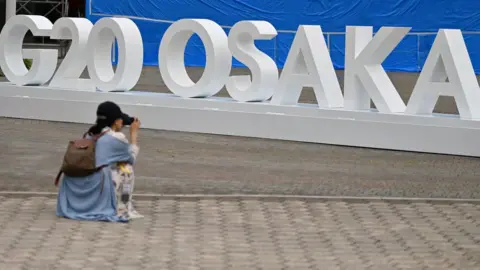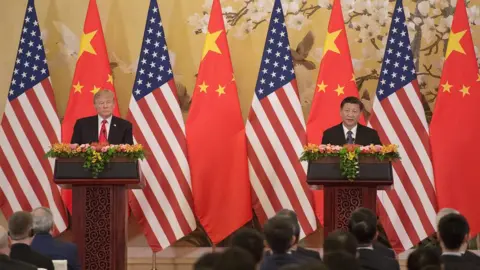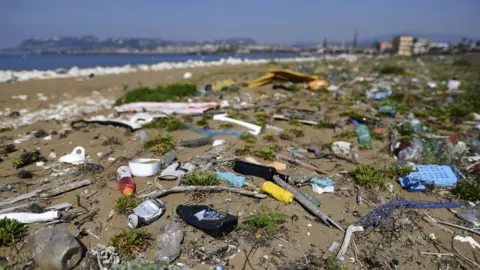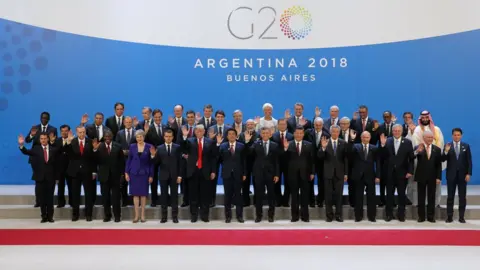G20 summit: All eyes on Trump-Xi trade war showdown
 Getty Images
Getty ImagesLeaders from the Group of 20 nations (G20) will meet in Osaka from Friday in what is likely to be its most important summit since the global financial crisis.
When the G20 met in Washington one month after the Lehman Brothers crash in 2008, they were focused on a mammoth task: how to piece the world economy back together and avoid a future crisis.
A decade later the G20 nations face another huge challenge in resolving a US-China trade war that has rattled businesses around the world, and cast a shadow over the global economy.
That's why the meeting between US President Donald Trump and Chinese President Xi Jinping on Saturday will be so closely watched.
They last met seven months ago at another G20 summit in Buenos Aires. Over grilled sirloin and caramel rolled pancakes, the pair agreed on a 90 day truce to their trade war.
Now, reports are emerging that another trade truce could be struck in Osaka.
While that would provide markets with some relief, it won't mean the trade war is over.
In the months leading up to the G20 meeting in Japan, the trade clash between the world's two largest economies has escalated.
The US tightened restrictions on Chinese telecom champion Huawei and four other Chinese tech firms by putting them on a trade "blacklist".
 Getty Images
Getty ImagesBeijing responded angrily with threats of its own trade ban, and in recent weeks has increased scrutiny on American firms operating in China, including FedEx.
If they don't strike a trade deal, Mr Trump has threatened to impose tariffs on $300bn (£236.5bn) of Chinese goods - that would mean pretty much everything that China sells to the US would be subject to tariffs.
But while many US businesses approve of Mr Trump's hardline stance on China, more tariffs is the last thing they want.
Companies have urged Mr Trump to end the trade war, warning of higher prices and risks to their future.
Both leaders are under pressure at home to show they are walking away with the best deal - so they won't want to give too much ground.
But with China's economy slowing, and Mr Trump heading into an election year, neither side can afford to let the trade war go on for much longer.
If a truce is announced, there will be relief from G20 nations too.
The trade war is having an impact on global growth, with the International Monetary Fund and others warning that escalating US-China trade tensions are among the biggest threats to the world economy.
Iran and the US
Rising tensions between the US and Iran is another issue likely to be on the minds of many at the G20 summit.
This week the US announced fresh sanctions on Iran and the country's Supreme Leader Ayatollah Khamenei - moves Mr Trump said were a response to recent "aggressive behaviour" by the country.
Their spat has led to oil prices shooting up over fears of a conflict between Washington and Tehran.
Expect the US president to try to shore up support from allies for his sanctions on Iran - and expect Beijing to back Iran, albeit subtly.
Plastic waste and marine fears
Environmental issues are likely to get a fair amount of attention at the G20 meeting.
As the summit chair, Japan is hoping to get an agreement from G20 members on the reduction of plastic waste in the ocean.
 Getty Images
Getty ImagesThe UN says that some 300 million tonnes of plastic waste is produced every year, and around 8 million tonnes ends up in our oceans, killing marine life and choking up our oceans with toxic chemicals.
By 2050, the UN says, if current trends continue our oceans could contain more plastic than fish.
So expect more efforts by Japan to get firm commitments from countries to ban single use plastic, and reduce plastic waste to zero in the oceans.
But also expect some resistance from the US, over concerns of what this could do to its petrochemicals and plastics industries.
Rising protectionism
One more issue to watch is how the leaders seek to position the G20 on free trade.
Part of the G20's mandate is to "resist protectionism," says John Kirton, founder of the G20 Research Group.
But at its last meeting in Buenos Aires, the group refrained from repeating that pledge due to pressure from the US.
It marked the first time a G20 communiqué had not contained that phrase.
 Getty Images
Getty ImagesThis time, Mr Kirton says the G20 is likely to affirm some kind of commitment to free trade, but may still drop the pledge to resist protectionism.
Still, he says as the US pushes ahead with protectionist policies, many nations are moving in the other direction.
"New free trade deals are breaking out all over," he says.
It comes at a time of increasing recognition that the current international financial system is in need of reform because it hasn't benefited everyone, so expect some discussion on that too.
Formed in the aftermath of the Asian financial crisis, the G20 came together in recognition of the fact that we live in an increasingly interconnected world.
So when there's a currency crisis in a far flung part of South East Asia, there is the risk of contagion.
History has shown that coming together to solve the world's problems has worked. What hurts one of us, could hurt the rest of us - so it makes sense to work together.
Indeed erecting trade barriers, instead of co-operating could lead to conflict. That will not help any of us.
